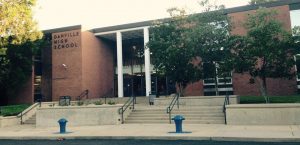 This is the first column of a four-year series that will focus on my high school journey through extemporaneous speaking. Assisted by old ballots and a journal kept during these years, these columns will provide reflections on lots of old competitions and the lessons learned along the way. Each week that a tournament took place in my career, one of these columns will appear.
This is the first column of a four-year series that will focus on my high school journey through extemporaneous speaking. Assisted by old ballots and a journal kept during these years, these columns will provide reflections on lots of old competitions and the lessons learned along the way. Each week that a tournament took place in my career, one of these columns will appear.
Before we get to the first tournament, though, we have to discuss my getting onto Danville High School’s team. This column will be a longer than the next one, which will follow on Friday and get into rounds and reflections, which will be the primary focus of these pieces.
The Road to Auditioning for the Team
As I prepared to enter high school in 2000 I never imagined that I would become part of the school’s forensic program. Most of my extracurricular activities in middle school centered around Boy Scouts and academic team. And my public speaking experience was limited to a few church appearances and reading an obituary that I wrote for George Washington that won a local Daughters of the American Revolution (DAR) contest the previous fall.
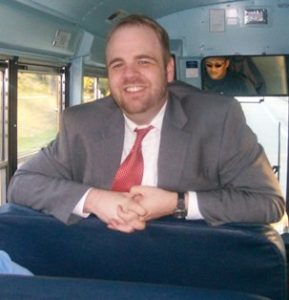
Steve Meadows, my coach from 2000-2004 and NSDA Hall of Fame inductee. Behind him is James Murphy, our longtime bus driver who was always a helpful hand at tournaments for loading and unloading file boxes.
Danville High School had a strong program, founded in 1994 by Steve Meadows, an English teacher who came from Beechwood High School in Northern Kentucky. Under his leadership Danville gradually worked its way up the rankings to compete for state championships, placing second at the Kentucky High School Speech League (KHSSL) State Championship from 1998-2000 and second at the Kentucky Educational Speech and Drama Association (KESDA) State Tournament in that period. The year before my arrival the team got a large front-page story in the local paper as Geoffrey Barton, a junior, won Original Oratory at the National Catholic Forensic League (NCFL) Grand National Tournament.
Still, I knew little about the forensic team and did not have a lot of interest in joining. At least until my mother told me it was something that I might be good at and should investigate. I also remember Mr. Meadows visiting my Honors English class during second period in September. He discussed what forensics was, the places the team traveled, and how it was a great way to meet people across the state. He also dropped off some packets outlining information and the audition process. Curious, and following a few other people that I was friends with, I picked one up on my way out of class.
In glancing over the events, I thought that Radio Broadcasting would be to my liking. People always said that I had the voice of a broadcaster. However, later in the day I was in math class and Joel Meister, a sophomore on the team who sat at a table with a few friends, told me that was not the right event. Days prior we had been having frequent conversations about the upcoming 2000 presidential election. Joel was a supporter of Vice President Al Gore and I was a supporter of Texas Governor George W. Bush. That summer I began watching a lot of news about the race, which included watching a lot of FOX News coverage from the likes of Bill O’Reilly, Sean Hannity, and Alan Colmes. Don’t be judgmental: This is back when FOX was not as hyperbolically partisan and somewhat revolutionary in its approach to current events coverage. It is also before I knew about better journalism on the pages of The New York Times, The Wall Street Journal, or The Economist.
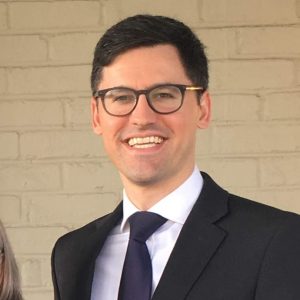
Joel Meister, now an attorney, was a sophomore on the DHS forensics team and was the reason I started doing extemp. Without him, this column and website does not exist.
What Joel told me was that someone who was interested in current events should do extemporaneous speaking. He told me the rules and it sounded intimidating. Only 30 minutes to prepare a speech? And you did not know what the topic was going to be ahead of time? There was something you had to reference called sources? And these sources came from big file boxes that we lugged to tournaments? I was skeptical but it sounded fun enough so I marked that down as an event of interest for the team.
Danville High School’s team was typically composed of 38-42 members. Those wishing to join the team each year, as well as those wishing to rejoin who did not reach elimination rounds at a post-season event the following season, had to audition for a spot. The audition in 2000 consisted of writing a one-minute original speech, memorizing a short monologue, reading a radio commercial, and doing a short impromptu speech. Then you might have to answer a few questions from Mr. Meadows and a few other coaches he brought in to watch the auditions.
Preparing for the audition was nerve racking. My prepared speech was a generic speech in favor of small government and I had several notecards prepared to make my argument. The monologue I took from the John Grisham’s anti-death penalty novel The Chamber. And I figured that I could do alright on the other two parts of the audition. Since I was not auditioning for an interpretation event I did not put a lot of thought into the monologue but I also did not want to look stupid, so I made sure I had it memorized before the audition.
Auditions were held during the last full week of September and I signed up for Thursday, the last available day. I had a late audition time at 4:30, so I spent 90 minutes after school rehearsing and worrying about how the audition would go. The latter is probably why it was not a good idea to sign up for a late time. But as a dumb freshman these are the types of experiences that you learn from. I remember my hands shaking. As the time counted down, I started to wonder if I had made a mistake and should just go home. I stayed. 4:30 soon arrived, the door to Mr. Meadows’ room opened, and my foray into forensics began.
The Audition
My audition featured a three-person panel. Mr. Meadows sat at the center and there were two coaches that were students at nearby Centre College. I handed him my information sheet, he welcomed me to the audition, and had me begin to go through the audition process.
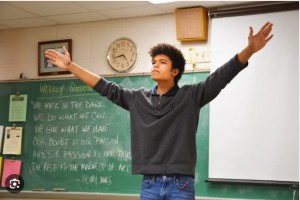
While this picture came later, this was what the front of Mr. Meadows’ classroom was like. Green chalkboard, a quotation of the day/week, lots of handouts, and a clock that saw LOTS of speeches.
The first part was the prepared speech. Since I had notecards, I was not worried about having to memorize this. I gave a passionate advocacy for small government, which I am sure many of my audience members thought was weak on analysis. I am also sure that I took a generic jab President Bill Clinton, hilarious in retrospect considering that President Clinton proclaimed in his second term that “The era of big government is over.” The speech completed without stumbles, so I was proud of that and felt it was a check mark in my favor.
Next was the monologue. This was the part of the audition I was not looking forward to. First, it was memorized and I hated memorizing long pieces. And I never thought of myself as an actor. When prompted to start, I did so and smoothly got through all of the words. I tried to put some dramatic emphasis on phrases, which was the best I could do because pulling off accents was not my forte. Again, no crash and burn.
The radio commercial was next. I went to the podium in Mr. Meadows’ room and there was a radio commercial on it. I was given a few moments to look it over before I had to read it aloud. As I began reading it out loud, I started reading too quickly and I stumbled, which compounded itself when I restarted. I was mortified by this because I thought this was going to be the strongest part of my audition. Still, I figured you just have to fake some things to make them and I got through the short commercial.
For the impromptu bit, I had to draw a topic out of a manila envelope. I ended up drawing “toothbrush.” Then I had to start talking about it. All I managed to say were the various functions of a toothbrush and that was it. So I clocked in around ten seconds. What an illustrious beginning for a career of someone who wanted to do limited preparation events!
To end the audition, Mr. Meadows saw that I wanted to do extemporaneous speaking. I wrote on my information sheet that Joel Meister recommended me for the event, which made him laugh a bit. He asked me if I could name the permanent members of the UN Security Council, which I could. He also asked if I could name some justices on the U.S. Supreme Court and how they leaned, which I could do as well. Despite my bad impromptu speech, that probably sold me enough to be slotted into extemporaneous speaking on the team.
After leaving the audition, I felt good about it. I made a few mistakes and while I feared that my terrible impromptu speech could hold me back, I thought I had sold myself enough for a spot on the team.
When school ended the next day, Mr. Meadows put up the names of those who had made the cut for the 2000-2001 team. On the second column, halfway down, my name was there.
Learning Extemporaneous Speaking
Now that I was on the team the race was on to learn the event before the team’s first tournament of the season on November 11 at Scott County High School. At my first practice I was given my first “filing” task as during this era in extemporaneous speaking there were big tubs that contained files with articles in them for use in rounds. Danville’s team used the A-Z method of filing so files went from abortion through Zimbabwe, including clippings primarily from The Wall Street Journal and The Economist. Since was got physical copies of The Wall Street Journal, I was told to look through and cut out articles that were important. But what was important? The answer given to me by Joel was to look at the front page stories and get those and then also get the opinion-editorial section in the back. So I started cutting up the newspaper, hoping that I was doing it right. At first I thought this was boring, tedious work. Later I would learn to love it and to this day I cannot look at a newspaper or magazine without having an instinctual desire to rip it apart like Mel Gibson’s character in the film Conspiracy Theory. At practice later that afternoon I did not give a speech but instead watched Joel’s speech. He discussed the political situation in the ex-Yugoslavia and I sat there wondering “How am I ever going to give a speech like this? I don’t even know what this country is!” Then, Mr. Meadows had a conversation with me about the structure of the event. The next week I would give my first speech.
So, a week passed and I returned to practice, which would always take place on Thursday afternoons for the next four years of my high school career. I helped wheel down our two file tubs to the end of the hallway into a special educator’s classroom and waited until it was time for me to draw. To draw I had to return to Mr. Meadows’ room. My first draw was a disaster. I drew a question on the Concord jet’s safety, senior citizens getting their money stolen from scammers, and another topic that is lost to my memory. Even though I had been watching the news, I knew nothing about these topics. I went ahead and picked senior citizens, thinking maybe our “Crime” file would have something.
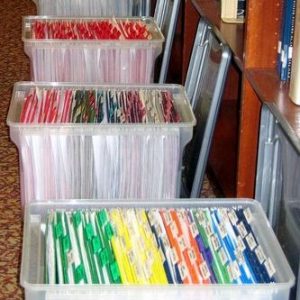
These weren’t our files (our tubs were bigger) but this the way extemp was done before Internet was allowed.
I walked back to the draw room and tried looking through files. Did the “Crime” file have anything? No. “U.S. Economy’? Nope. At this point, all hope seemed lost. The most that I could think to do was to look through a book called Power Quotes that I would lean on a lot in the future. I select one from Edmund Burke: “The greater the power, the more dangerous the abuse” that I was somehow going to connect to these evil scammers calling old people and defrauding them of their savings! The speech itself had one source, a statistic about how many Americans were elderly. One would think that 30 minutes of prep would last a while but in my first experience it went by as the fastest 30 minutes of my life!
When I arrived in Mr. Meadows’ room, I had my notecard ready to go with too many notes written on it. However, I did not bring my question slip. He asked for it. I said I left it in draw. And he ordered me to go back and get it because that is how a tournament would work. “Great,” I thought to myself. “First speech and I am already screwing up.” After walking quickly back to his room, I handed him the topic. Meanwhile, national champion Geoffrey Barton is sitting in a corner of the room reading over some things to prepare for his new oratory of the season. I was hoping for an audience of one. No such luck. When I started my speech, I started too close to the chalkboard and nearly knocked some things off there. The structure of my speech was okay but there was no depth to it. After all, what can you say for a question like this one? After what felt like an eternity for me, the disaster of a speech was over. Total time? 2:08.
I knew the speech was terrible and I was fully prepared to get torn into by a high-level coach for falling short of expectations. But to my surprise, Mr. Meadows was not critical. Instead, he highlighted what went well, complimenting the introductory quote and how I had a structure for the speech. So that made me feel better about my performance. It is also something that I remembered when coaching younger extempers as you need to let younger speakers talk and build them up rather than trying to point out lots of criticisms, especially early. I vowed to do better next time.
The next week is when I think my actual career in extemporaneous speaking started. I drew a question on whether the Cuban embargo should end. I had a decent understanding of this topic from the news that I had seen and our files actually had articles about it! So prepping the speech was easier. When I gave my speech the time was much better: 5:35. I think this is when Mr. Meadows also saw some more of my potential as he commented that this speech was much better than the one that I had done the previous week. This time the practice focused on giving me the extemp walking pattern for each of the points rather than stay in each place.
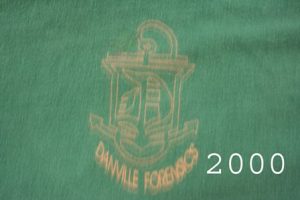
Albeit blurry, this was the logo for our Danville forensics team shirts in 2000. The only time you would catch me wearing the yearly team shirt was when we hosted our mid-November tournament. Suit & tie all day!
As I kept practicing throughout October, my confidence in the event grew. I thought I had a good handle on some of the elementary structure of the event. I kept watching the news (although I was only watching what was on television and not reading) and that helped my knowledge of domestic events, although my knowledge of international events was practically nil. I also found friendly competition with classmate Bill Ellis, who was also on the team for extemp, about trying to give speeches and get closer to 7:00 in our speaking time.
Finally, the big week arrived before Scott County. At my last practice before the tournament, Mr. Meadows advised me how a tournament worked. I had already gotten most of this information from an Election Day workshop the team held regularly, using veteran members to calm the nerves of novices. The Scott tournament would have three preliminary rounds and then there would be a break to finals for a top six. He said there might be six competitors there or more than twenty. No one knew until we arrived. But he was confident that if I did what I was doing recently in practice in terms of speaking for a decent length of time, having a coherent structure, and maintaining good posture/eye contact that I would have a good chance at pushing through into the top six. So I left Thursday’s practice confident but anxious. What would this first tournament be like? How would I do?
Check back late tomorrow for the next column, which will breakdown the speeches and experiences of my first tournament at Scott County High School on November 11, 2000.
